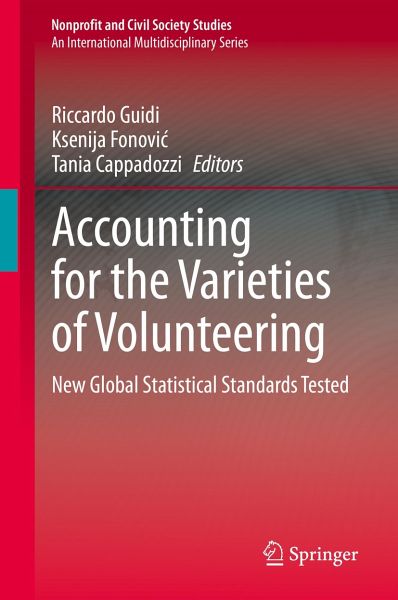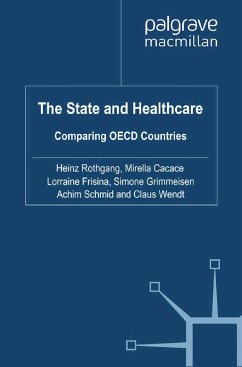
Accounting for the Varieties of Volunteering (eBook, PDF)
New Global Statistical Standards Tested
Redaktion: Guidi, Riccardo; Cappadozzi, Tania; Fonovic, Ksenija
Versandkostenfrei!
Sofort per Download lieferbar
Statt: 149,79 €**
104,95 €
inkl. MwSt.
**Preis der gedruckten Ausgabe (Gebundenes Buch)
Alle Infos zum eBook verschenkenWeitere Ausgaben:

PAYBACK Punkte
52 °P sammeln!
For a long time, volunteering lacked standardized data sets allowing methodologically robust comparative analyses and global policy making. Starting from 2011, the International Labour Office (ILO) and the United Nations (UN) have provided global statistical standards for organization-based and direct volunteering which offer path-breaking opportunities.The global statistical standards on volunteering are however only relatively known. They also have to face difficult methodological and substantial challenges: Can they really account for the local varieties of volunteering in the different are...
For a long time, volunteering lacked standardized data sets allowing methodologically robust comparative analyses and global policy making. Starting from 2011, the International Labour Office (ILO) and the United Nations (UN) have provided global statistical standards for organization-based and direct volunteering which offer path-breaking opportunities.
The global statistical standards on volunteering are however only relatively known. They also have to face difficult methodological and substantial challenges: Can they really account for the local varieties of volunteering in the different areas of the world? Does their adoption further develop our knowledge of volunteering both at national and international level?
Beyond illustrating which innovations these statistical standards bring and critically assessing the tensions between the global guidelines and the local differences, the book shows how the ILO and the UN standards can be implemented into national statisticsand which advancements in the understanding of characters, antecedents and impacts of contemporary organization-based and direct volunteering they allow. The Volume takes Italy as an illustrative case that offers global value.
This multidisciplinary book demonstrates that a holistic approach to the implementation of the ILO and UN guidelines permits to virtuously balance international statistical standards and locally embedded cultures as well as to move knowledge of volunteering forward in a complexity-driven agenda. The book provides tools, evidences and inspiration for scholars, statistical agencies, practitioners and policy-makers.
The global statistical standards on volunteering are however only relatively known. They also have to face difficult methodological and substantial challenges: Can they really account for the local varieties of volunteering in the different areas of the world? Does their adoption further develop our knowledge of volunteering both at national and international level?
Beyond illustrating which innovations these statistical standards bring and critically assessing the tensions between the global guidelines and the local differences, the book shows how the ILO and the UN standards can be implemented into national statisticsand which advancements in the understanding of characters, antecedents and impacts of contemporary organization-based and direct volunteering they allow. The Volume takes Italy as an illustrative case that offers global value.
This multidisciplinary book demonstrates that a holistic approach to the implementation of the ILO and UN guidelines permits to virtuously balance international statistical standards and locally embedded cultures as well as to move knowledge of volunteering forward in a complexity-driven agenda. The book provides tools, evidences and inspiration for scholars, statistical agencies, practitioners and policy-makers.
Dieser Download kann aus rechtlichen Gründen nur mit Rechnungsadresse in A, B, BG, CY, CZ, D, DK, EW, E, FIN, F, GR, HR, H, IRL, I, LT, L, LR, M, NL, PL, P, R, S, SLO, SK ausgeliefert werden.












